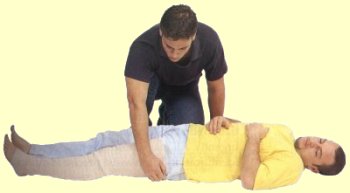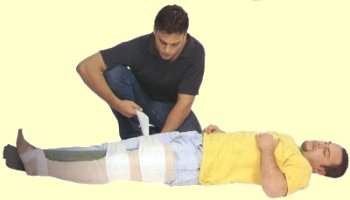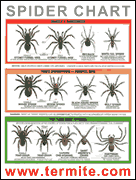 |
|
 |
Reassure the patient - their life is not in danger - an anti-venom is available at the hospital.
A pressure/immobilisation bandage should be firmly applied (but not tight) wrapping the entire limb bitten - similar as for a sprained ankle. This compresses the tissue, thus reducing the flow of venom along the limbs - as illustrated by the pictures below.
A second bandage can be applied to immobilise the affected limb using a splint. This will minimise movement of the muscle of the affected limb in order to reduce the rate of blood flow and venom therein to the vital organs of the body.
Seek Medical Aid immediately. Call the AMBULANCE phone 000 rather than transport the victim.
If safe to do so, collect the spider for identification.



